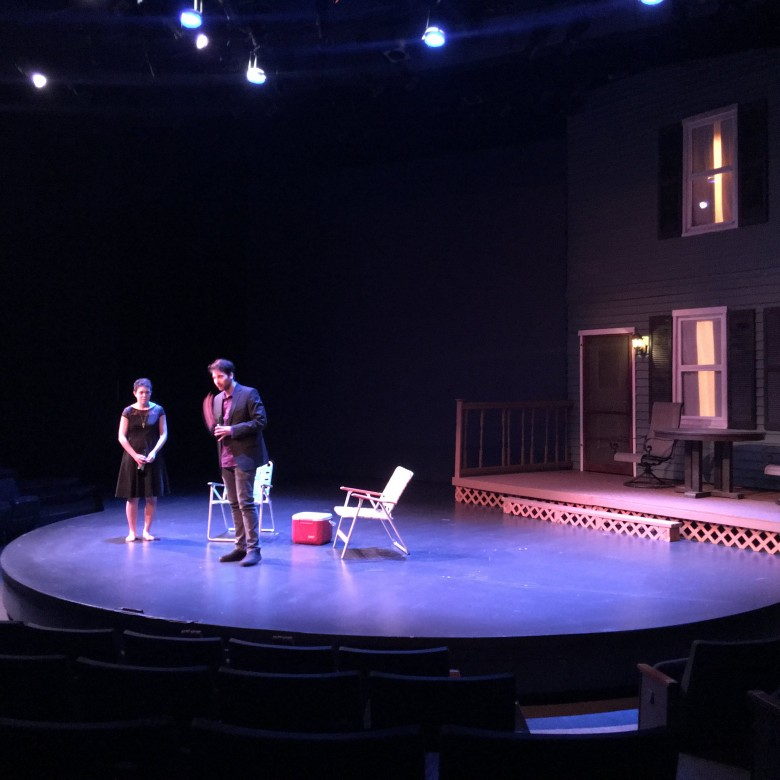I looked up the word proof in various dictionaries and found two uses that seem relevant to the play Proof by David Auburn, the current production by Buffalo Laboratory Theatre at Shea’s 710 Theatre. Proof, which won the Pulitzer Prize in 2001, is a serious drama that examines genius and madness, family grief and disagreement, and the fears of a brilliant young woman that she may inherit her father’s madness along with his genius.
Catherine (Marissa Biondolillo) is a young woman whose father Robert (Dave Hayes) recently died. He was a mathematical genius who went completely “bughouse,” as he put it. She left school to take care of him. In the opening scene, Catherine and her father are talking in the yard. It is her 25th birthday and he gives her a bottle of champagne and worries that she has no friends and is depressed, expressing himself in mathematical metaphors. They discuss how one knows if one is crazy. He tells her “crazy people don’t sit around wondering if they’re crazy.” Since this conversation is taking place the night before his funeral, Catherine worries that she, too, will become "bughouse."
Enter Hal (Sean Marciniak), a mathematics Ph.D. candidate and former student of Robert, who has been going through Robert’s 103 notebooks in the hope of finding something mathematically spectacular. They have a tiny flirtation and a large confrontation that leaves Catherine feeling as crazy as she fears she is becoming. Enter Claire (Tracy Snyder), Catherine’s sister from New York, who has come home for their father’s funeral. The sisters, who are at odds with each other, squabble and grapple with the death of their father, who was the linchpin that held the family together after the death of their mother.
The set by Jeff A. Ramirez is a simple deck and backyard of a house in Chicago. There are no distractions from the dialogue as the four characters talk, argue, and occasionally laugh their way through this engrossing play. The audience is drawn into Catherine’s predicament. How will she find her way back into the world after leaving school and isolating herself to care for her father? Will she go mad as her father did? And what of the mathematical proof that Hal finds in one of Robert’s notebooks tucked away in a locked desk drawer to which Catherine has given him the key?
As a noun, proof is evidence or argument establishing or helping to establish a fact or the truth of a statement. In mathematics, proof means something is true. In human relationships, how is one to know if the “truth” is true, even with evidence? Evidence may be excluded or not yet known that would change the “truth.” Is Claire’s assessment that Catherine is unstable and needs professional care, which is based on Catherine’s sometimes out of control behavior, proof of that, or is it simply that Catherine has reached her emotional limit and needs to rest and regroup? How are we to know which is proof and which is just opinion based on observation?
As the play unfolds, flashback scenes between Catherine and her father explain the history that has led to the current circumstances in the play. These are the most poignant scenes, watching this brilliant man lose his mind, with his loving daughter unable to do anything but watch it happen and care for him as best she can. This has left her emotionally exhausted, withdrawn, and very angry.
Ms. Biondolillo does her best with her very demanding role. She shines in her scenes with her father, and is lovely and shy as her flirtation with Hal blooms into romance. It is in her anger and denial of her precarious mental state that she falters at times. Her strident tones and tantrums are more those of a churlish teenager than a frightened woman on the edge. However, her interactions with Robert, romantic interlude with Hal, and dry sarcasm with Claire lift her performance. Mr. Marciniak as the nerdy, geeky Hal who has had his eye on Catherine for a long time, does a fine job. His timing is excellent, and his self-deprecating humor and courting of Catherine add lightness to the play. Mr. Hayes as Robert shows us a man who has lost everything and yet retains his loving humanity. As he sits in the yard in his t-shirt in December and explains to Catherine that he is back, he is working again, he has something new and incredible, we see him gradually break down as Catherine reads what he has written back to him. His Robert breathes, thinks, and feels math. It is what he loves and provides a window into his genius and his madness. Ms. Snyder as the intrusive, know-it-all sister Claire, is very good in a rather thankless role. She believes in what she is saying, and her concern for her sister feels real, if misguided. She is the catalyst that forces Catherine to make decisions about her future.
Direction is by Katie White, who keeps the dialogue moving, and shows a sure hand with her cast. The music, composed by Stephen Warbeck for the 2005 movie beautifully captures the mood of the play, and works well during scene changes.
As to the second meaning of proof, this time as an adjective, it means able to withstand something damaging. This is the central question for Catherine. Is she proof against the emotional minefield of her past, and her anxiety that she might turn out as her father did?
Proof is at Shea’s 710 Theatre at 8:00pm on Fridays and Saturdays, and at 2:00pm on Sundays through April 2.
PROOF
Thu Mar 23rd → Sun Apr 2nd
Days: Sun, Fri, Sat

